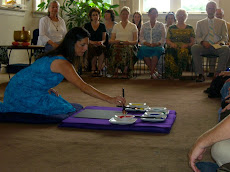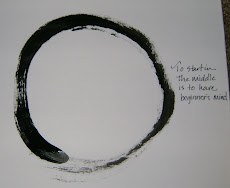Back in January (oh - it does feel like way back, and yet it's been less than two months), I posted about ritual and routine and the differences between the two. In the questionnaire I gave three "non-contemplative" (though, I have a sneaking suspicion they are contemplatives of sorts) teachers at my school, I asked them what they thought the differences were between routine and ritual as well.
Here are their answers:
Teacher A*: A routine is something you do on a regular basis, similar to a habit. A routine provides consistency and discipline. Rituals take what on the outside looks like a routine, but to the individual ties them to a greater purpose or time.
Teacher B: "Routine" is a word or idea without value judgement. It is simply a series of motions that have become, or will become habit. A routine is neither "good" nor "bad." A ritual is a specific thought or action which should serve a purpose. Ritual is more formalized and is usually not just an "accident."
Teacher E: Routine has to do with that which is customary or commonly practiced. A ritual, which one might perceive as a "good" thing can become routine, which probably means it has lost its depth of meaning or transcendance for the practitoner.
"Purpose" and "meaning."
In his book, 36 Tools for Building Spirit in Learning Communities, author R. Bruce Williams says that rituals "point to something meaningful and significant"(p. 122). This is a part of my understanding (and practice) of ritual, and it is clear that this is also true for some of my colleagues.
Of great interest to me was reading about each of my three colleagues' personal morning practices to ready themselves for the school day ahead:
Teacher A: Paryer is part of my morning routine. It involves reading scriptures from the bible. It is my time to center myself and bring peace before beginning a day of taeching.
My routines involve sending all emails personal and school-related prior to leaving home for the day; Preparing my planner for the week/day with any tasks or schedules, personal or professionally-related.
Then I prepare my class schedules for the day or week. I listen to classical or spiritual music while doing all this - and especially while grading student papers.
Teacher B: Each morning I intentionally spend time alone. I have a specific chair in which I sit with my planner, a book, and my journal. I begin with prayer in three categories: "pray for," "thank for," and "forgiveness for." I write those down and give them to God. Then I read Scripture. From there, I plan my day and reflect on putting people before things. Then I read an inspirational work, currently Steven Covey, and then I get ready. Sometimes I review or work on my Personal Mission.
Teacher E: My first thoughts in the morning usually are prayer. Later, I often use a variation on a Quaker prayer that I heard about at a Promise Keeper's conference: palms up (acknowledging God's presence, his provision, love, and guidance); palms down ("please take from me everything that displeases you"); and palms up ("fill me with your Holy Spirit, your love, your truth, and your grace").
While not a ritual, I derive great pleasure from studying the Bible. My current studies are taking me through the sermons of Jesus in the Gospel of Matthew.
I would liken my morning rituals and how they help me connect with the present, myself, and a Higher Power - how they set the tone for my day - to what my colleagues do in the morning to ready themselves for the day ahead.
Reading about my colleagues' practices has been insightful, not just in terms of gathering data, but also in terms of getting to know a few of my co-workers a bit better. I was talking to Teacher A after school for awhile today about some of the questions I asked, and she said she would actually really like to know how she could incorporate some ritual into her classes, but wasn't sure how that would bode well with math. I told her I was excited to have the opportunity to speak with her further about that (it's been difficult for everyone to find a date to meet, so she and I will probably meet sometime next week over spring break). What I am mostly excited about is connecting with my colleagues on a deeper level.
Though we may not engage in any rituals together, the topic of ritual, itself, has helped foster a connection between myself and a few of my colleagues. Not so routine, eh?!
*The teachers are labeled Teacher A, B, and E because each letter represents the initial of their first names.
Lizard Coloring Page
2 years ago





2 comments:
Did it surprise you that your colleagues have daily routines/rituals that are so spiritual in nature? Did you expect to find that?
While doing my thesis interviews with colleagues, I was surprised by how spiritual, though not necessarily religious, my colleagues are in their approach to their teaching vocation. I really had no idea.
Did you? Do you suppose that is true in all vocations? or is it something unique to teaching (and maybe other helping professions)?
I don't know that I was "surprised." I was excited about the fact that all three of the people I gave the questions to had some kind of practice - daily rituals - that were important to them that they felt helped them prepare for their day.
I imagine that in any vocation that requires real heart sense and felt sense, there are many who utilize spiritual practices. Even if they are not practiced daily. I would imagine there would have to be a "something."
As usual, you have asked good questions. Though I just offered some quick answers, I really don't have any. The questions are good because they require more exploration. Thank you for asking them.
Post a Comment